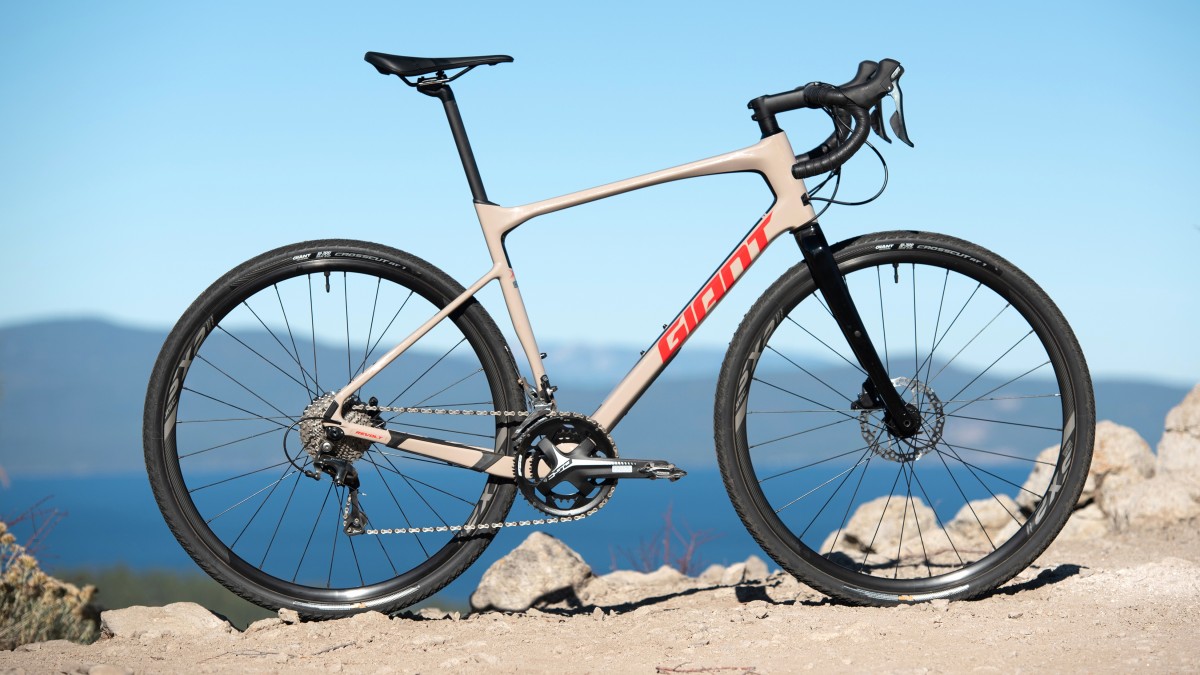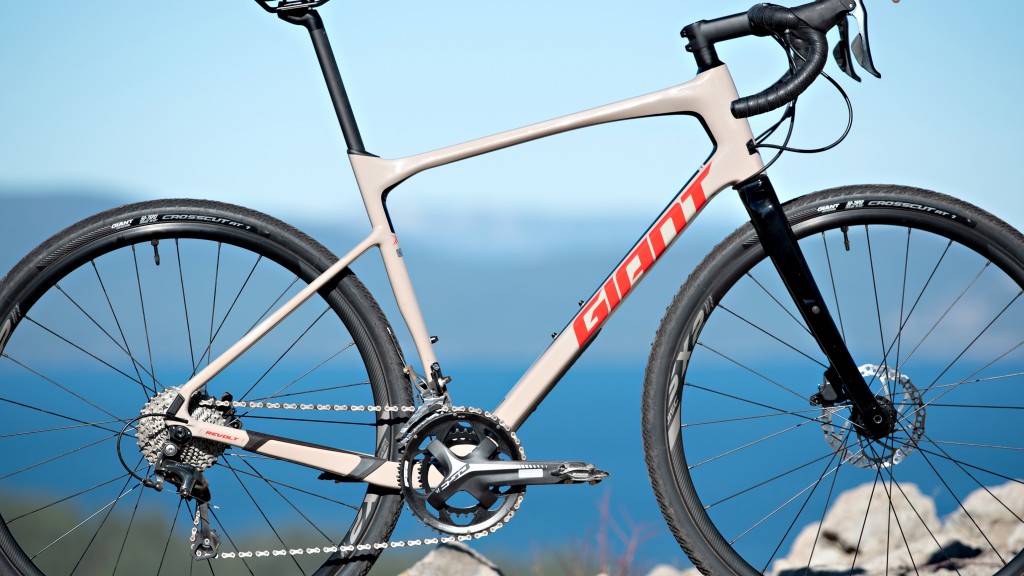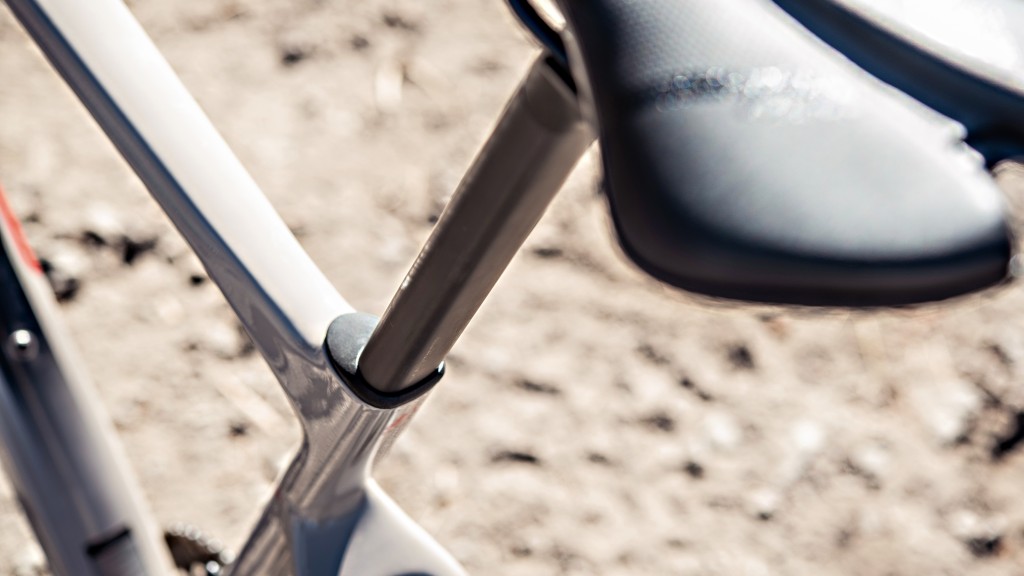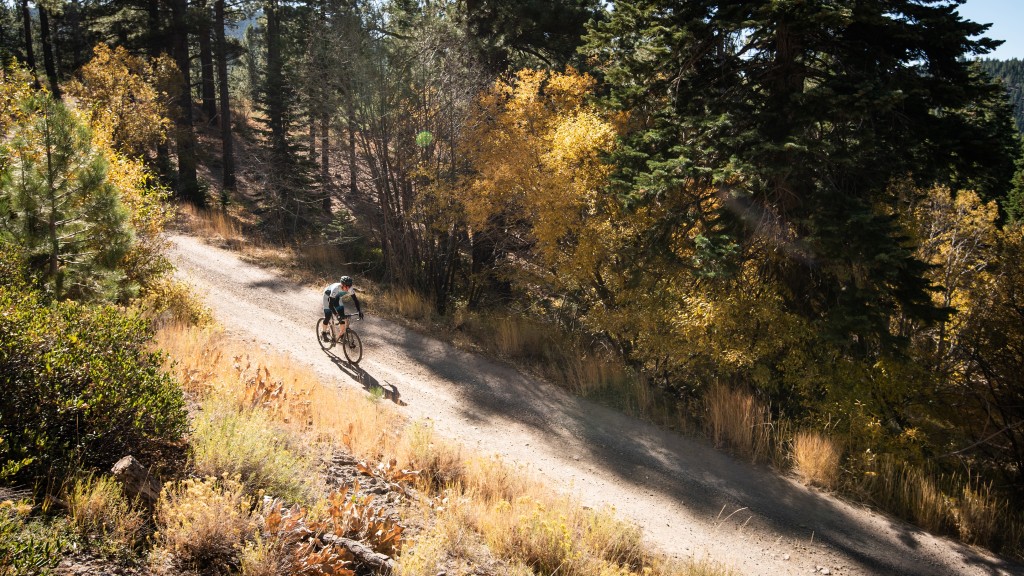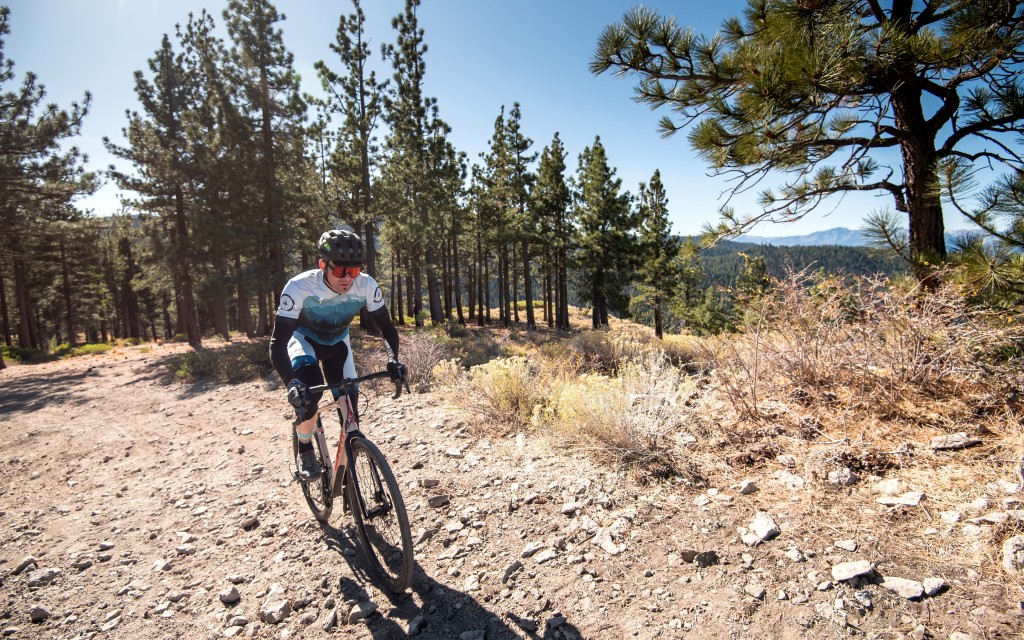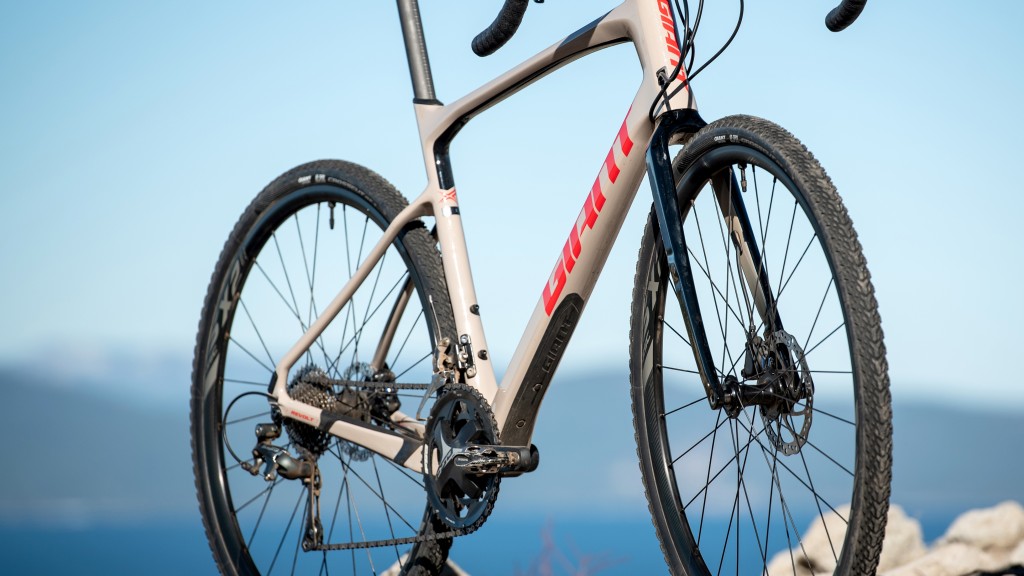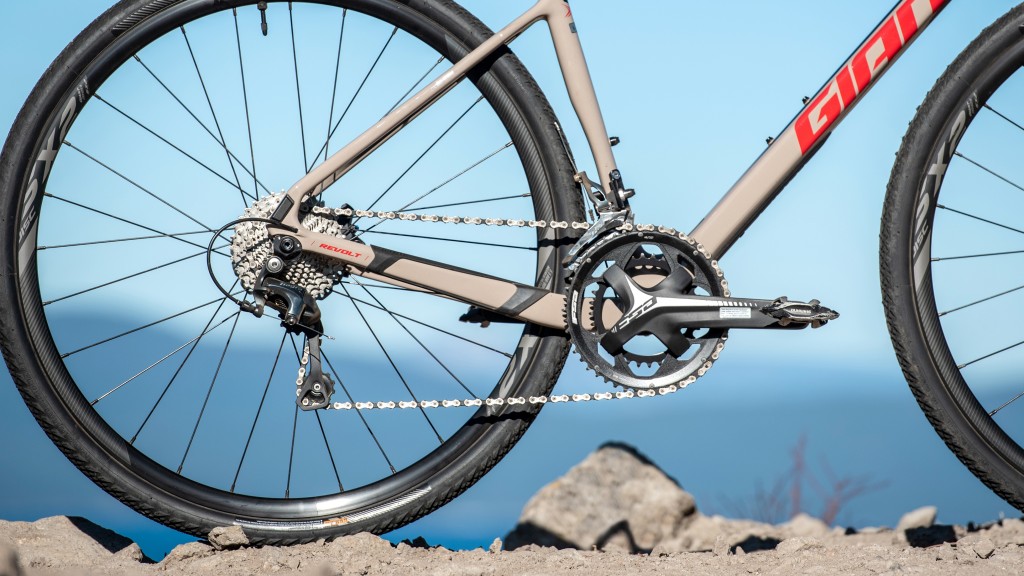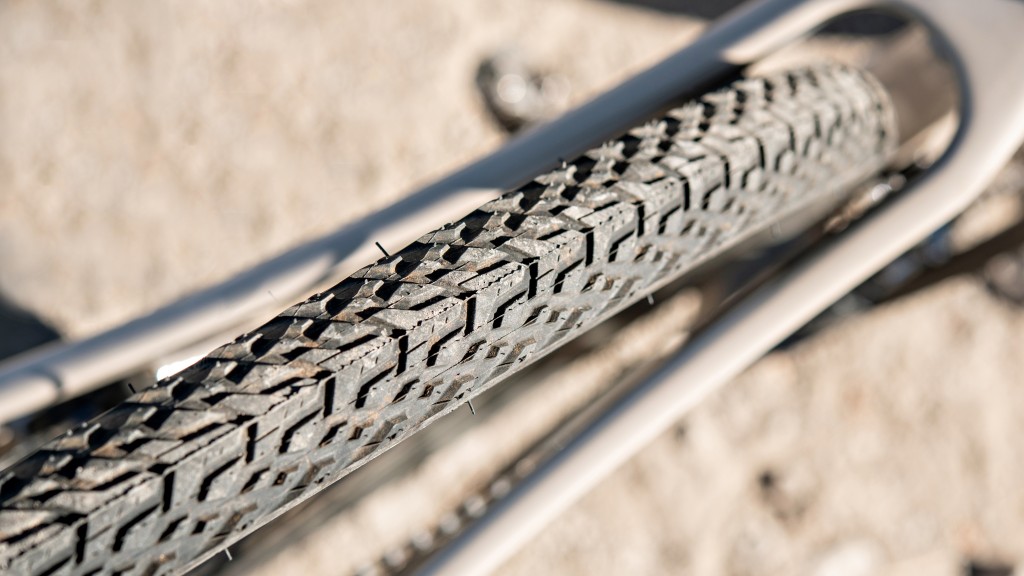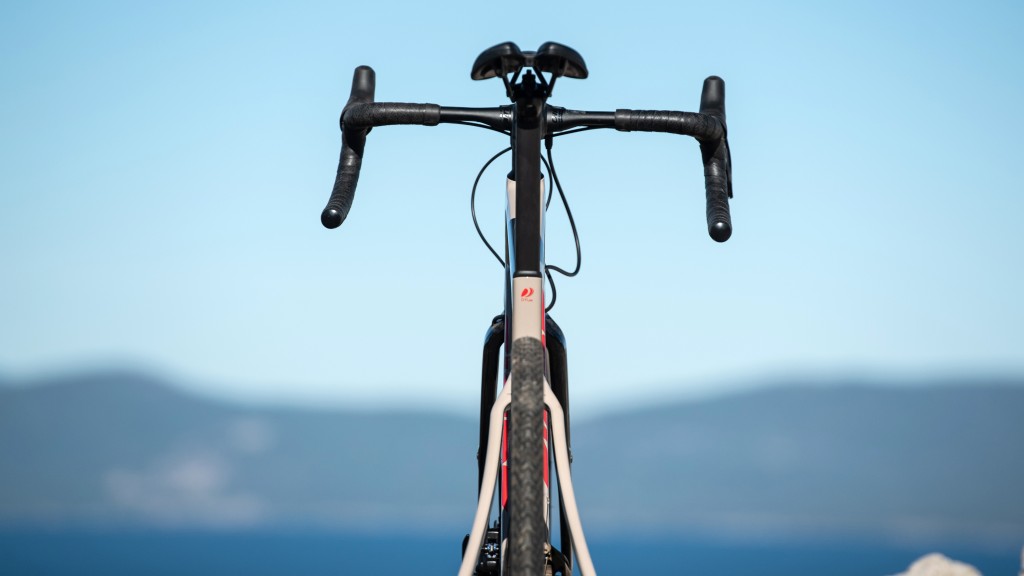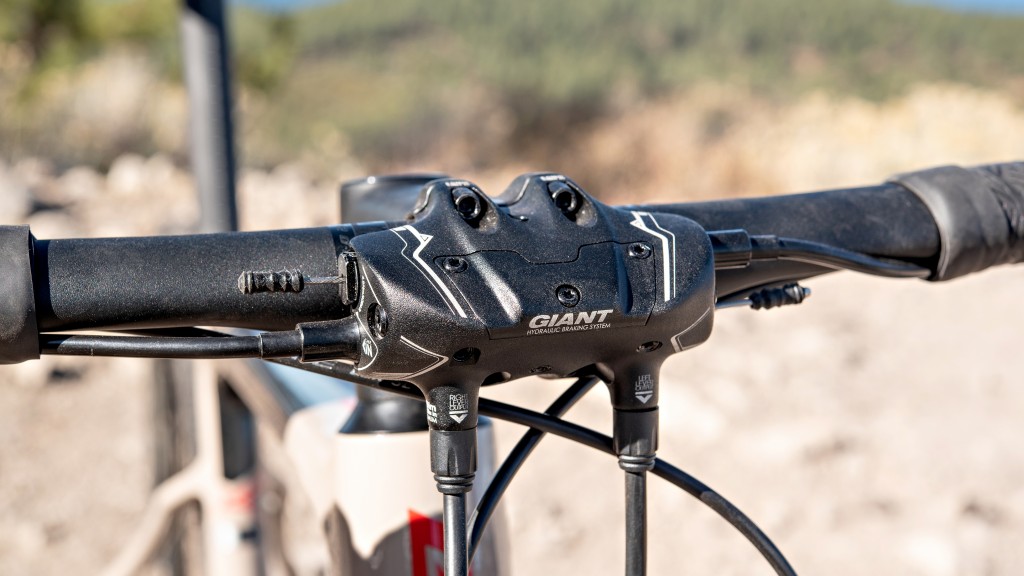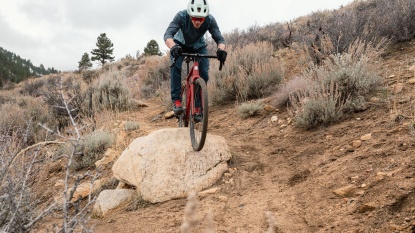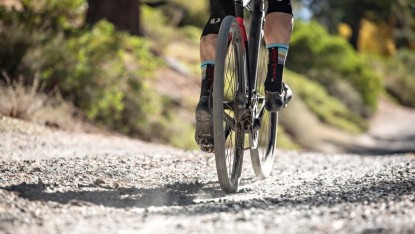Giant Revolt Advanced 3 Review
Our Verdict
Our Analysis and Test Results
Frame Design
The Revolt Advanced 3 is built around Giant's Advanced composite frame and fork. This lightweight carbon frame features Giant's “versatile gravel geometry,” full-length internal cable routing, integrated downtube protection, and mounts for racks and other accessories. It features Giant's Overdrive oversized fork steerer tube, which is intended to provide maximum steering stiffness. The seat tube is D-shaped to fit the proprietary D-Fuse composite seat post and is designed to help absorb impact and vibration while riding. The Revolt comes in 6 frame sizes, XS, S, M, M/L, L, and XL.
We measured our large test model and found a 575mm effective top tube with a 392mm reach. The head tube measured 71-degrees with a 73-degree seat tube angle. The chainstays were 425mm long with a 1046mm wheelbase and a 282mm bottom bracket height. It weighed 22 lbs and 7 oz set up tubeless without pedals.
Design Highlights
- Advanced composite frame and fork
- D-Fuse seat post and Contact XR D-Fuse handlebar to absorb vibration and impact
- Clearance for up to 45c tires
- Integrated X-Defender downtube protector
- "Smart mount system" for racks and accessories
- Internal cable routing
- Advanced carbon models ranging from $1,850 (tested) up to $3,550
- Aluminum frame model offered at $1,000
Downhill Performance
The Revolt Advanced 3 lost a little ground to the competition for its less confidence-inspiring downhill performance. Testers like the vibration reduction of the compliant handlebar, but the bike's geometry and some components hold it back compared to the competition.
The Revolt felt great when riding fast on flats or descending gradual pitches on smooth surfaces. This bike has a fast and racy feeling, and the D-Fuse seat post and handlebar noticeably take the edge off of chatter and smaller impacts. The frame itself is stiff, but it doesn't feel harsh at all. The rear triangle is just compliant enough to feel forgiving without sacrificing efficiency.
While the geometry of the Revolt is quite similar to most of the other bikes in this review on paper, it has a decidedly more aggressive, almost race-like feel and body position. The front end is simply lower, and this causes the rider to get into a more aggressive position on both the hoods and in the drops compared to the more relaxed positions offered by the competition. In fact, the stack height of the Revolt in size large is 37mm lower than on the 58cm Specialized Diverge, which is significant. It appears that the handlebar on the Revolt is at least an inch lower than all of the other models we tested in the same size. Testers found this body position to be less comfortable on the descents, with the slightly more upright positions of the other bikes providing a more confidence-inspiring feel.
The Giant Crosscut tires also didn't do the Revolt any favors on the descents. Sure, they work well on pavement and smooth, hard-packed gravel surfaces, but they didn't provide much in the way of traction in looser gravel conditions or when riding on singletrack trails with mixed soil types. That said, they roll fast and work well in the right conditions but don't inspire the confidence to try and rail gravel corners with speed. The Giant Conduct hydraulic disc brakes were also quite finicky with an inconsistent braking feel. We never experienced any dropped chains while riding the Revolt, though the 2x drivetrain tends to rattle quite a bit and make more noise compared to quieter 1x systems.
Climbing Performance
The uphill performance of the Revolt was one of its strongest suits. This bike rolls fast and climbs with the best of them. Sure, it's a little heavier than our top-rated models, but the stiff carbon frame feels efficient, and it scampers uphill with intention.
While the Revolt geometry feels a bit aggressive on the descents, it feels a bit more natural when the bike is pointed uphill. Sure, the front end still feels a little low, but you can find a relatively comfortable position with your hands on the hoods or on top of the handlebar. The 73-degree seat tube angle is properly steep for a gravel bike, and power transfer feels nice and direct with your weight right over the bottom bracket. The D-Fuse seat post soaks up some vibration through compliance without wasting energy while pedaling. Out-of-the-saddle efforts also felt great with no energy loss through frame flex thanks to the oversized rectangular downtube beefing things up between the head tube and bottom bracket.
Again, the component grouping of the Revolt Advanced 3 is perfectly functional, though it doesn't exactly shine on the climbs. The low-end Shimano Tiagra 2 x 10-speed drivetrain has plenty of range for just about any climb, but testers agreed that the shifting felt clunky, and we found ourselves shifting between the front chainrings more often than we'd like. Front derailleurs are going out of style, and this applies to gravel bikes as much as mountain bikes. We much prefer the simplicity and ease of shifting provided by 1x drivetrains. The tires also proved to be a little underwhelming on the climbs. They work fine on pavement and hard pack, but they tend to dig in and spin out in loose conditions.
Versatility
Giant designed the Revolt with versatility in mind. It seems they intended for it to be whatever you choose, from a gravel racer to an adventure bike packing rig. This intent is evident in details like integrated downtube protection and a smart mount system for racks and accessories. Giant claims it is compatible with third-party accessories to mount up front and rear racks, fenders, etc., so you can go from casual gravel rides or races to week-long bike tours with ease.
The somewhat more aggressive geometry of the Revolt lends itself well to road riding. If you like to road bike from time to time and maybe you're just a little gravel-curious, this could be a good option. Unlike the 1x drivetrains, the 2 x 10-speed drivetrain has gearing that is well suited to smashing pavement miles and gravel alike. We feel this could be a great winter training bike for racers who seek an affordable and versatile ride that isn't limited to the tarmac.
Giant has also included an array of accessory mounts for the bike's front that integrate into the front of the stem at the unique brake cable/hydraulic interface. This includes mounts for various Garmin products, a GoPro, and a universal light mount. Whether you're training for racing or commuting home in the dark, these mounting options are very convenient and a nice addition.
Weight
The Revolt Advanced 3 tipped the scales at 22 lbs, 7 oz set up tubeless and without mountain bike pedals. While this is by no means heavy, it is the heaviest carbon-framed model in this test, over 3.5 lbs heavier than our lightest model. Considering the lightweight carbon frame, we expected it to weigh less than it does. We attribute this heavier weight to the lower-end and heavier components that make up the build. This bike is very inexpensive for a carbon-framed model, and that is due to the budget-minded build that simply weighs more than higher-end parts.
Build
The Advanced 3 model is very inexpensive for a bike with a fancy carbon frame, and the build kit reflects that. While far from exciting, the components are perfectly functional and get the job done. Riders interested in flashier components would do well to check out the three more expensive Revolt Advanced models or the Advanced Pro Force.
Groupset
The Advanced 3 comes with a 2x 10-speed Shimano Tiagra drivetrain. This system includes the shifters, rear derailleur, and cassette. The cranks are FSA Omega with a 48/32-tooth combo paired with an 11-34-tooth cassette, and slowing and stopping duties are left to Giant Conduct flat-mount hydraulic disc brakes with 160mm rotors front and rear.
Wheels/Tires
Giant produces their own wheelsets, and the Revolt rolls on a set of Giant S-X2 Disc 700c wheels. These wheels are tubeless-ready with tape and valve stems pre-installed. Giant also makes tires, and they have mounted a set of Giant Crosscut AT 1 700 x 38c tires. These tires are tubeless-ready and have a fast-rolling and relatively low-profile tread design.
Cockpit
The Revolt Advanced 3 cockpit setup consists entirely of Giant branded parts. Giant has developed a line of D-Fuse parts intended to absorb shock and vibration. This setup includes the Giant Contact XR D-Fuse handlebar with lightly flared drops. The seat post is another D-Fuse component, and it is a unique D-shaped composite post that is vertically compliant with a slight but noticeable amount of flex to absorb impact and road feedback. On top of that seat post is a Giant Contact saddle.
Build Options
Giant makes four models of the Revolt Advanced including the Advanced 3 we tested. All of the Advanced models feature the same Advanced-Grade Composite frame and fork, although their build kits and prices vary significantly.
The Advanced 2 retails for $2,450 comes with the same wheels and tires as the model we tested, but the drivetrain is upgraded to a 2x Shimano 105 with Shimano 105 hydraulic disc brakes.
The Advanced one will set you back $2,600, and it comes with an SRAM Apex 1x11-speed drivetrain hydraulic disc brakes and a Giant P-X2 wheelset.
The Advanced 0 goes for $3,650 and comes equipped with a 2x Shimano Ultegra drivetrain and hydraulic disc brakes, Praxis Zayante carbon cranks, a Giant CXR-1 composite wheelset, and Maxxis Velocita 40c tires.
The top of the line Revolt Advanced Pro Force comes fully tricked out at $5,500. It comes with a 2x12-speed SRAM Force eTap AXS drivetrain, SRAM Force brakes, and a Giant SLR-1 composite wheelset.
Giant also makes a budget-friendly aluminum-framed model called the Revolt 2 that retails for $1,000. It has an ALUXX Grade aluminum frame and a full composite fork. It is clad with a Shimano Sora 2x drivetrain, Giant Conduct hydraulic disc brakes, and a Giant S-X2 disc wheelset.
Suggested Upgrades
There is little that our testers wouldn't upgrade on the Revolt Advanced 3. That said, we'd probably opt to spend a little more on the initial complete bike purchase than to slowly upgrade this build kit over time. As an entry-level bike, the components on the Advanced 3 get the job done, but we think it was an interesting choice to equip a fancy carbon frame with a grab bag of lower-end components. However, if this bike were ours, we feel that the drivetrain and the tires are the two things that we'd probably try and change first.
The Giant Crosscut 38c tires have a round profile and a non-aggressive tread pattern. Testers found these tires to work best on pavement and smooth packed dirt conditions, but that was about it. They didn't offer the best traction in anything loose, nor did they provide much confidence when cornering. If we were planning on doing some serious gravel grinding on this bike, we would swap them out from something with a more aggressive tread design.
The Shimano Taigra drivetrain was another low point. It works well enough, but this is a relatively low-end grouping, and the shifting performance leaves something to be desired. Our testers also prefer the simplicity and reduced noise of 1x drivetrains and find themselves shifting the front chainring more often than they'd like.
Should You Buy the Giant Revolt Advanced 3?
The Revolt Advanced 3 is Giant's affordable entry-level carbon fiber gravel bike. This bike is very inexpensive for a carbon-framed model, and Giant offers it a price point that the competition can't touch. To keep the price low, Giant has spec'd this model with a mixed bag of low-end components that don't exactly perform up to the level of the quality frame. That said, the build is functional and will serve riders just getting into gravel grinding with a versatile and comfortable ride. We feel this is a good one-bike quiver that could function just as well as a road bike as a gravel/adventure rig. It has a racy feeling geometry with a lower front end that excels in the flats and climbs, though it doesn't inspire much confidence in descents. It does have an exceptionally comfortable ride quality thanks to Giant's unique D-Fuse components that allow for compliance and vibration absorption in the seat post and handlebar. This takes the edge of high-frequency vibrations and rough roads and helps keep you feeling fresh. If you're looking for a carbon gravel bike and don't want to break the bank, this is a good place to start, though if you've got a little wiggle room in the budget, we'd suggest checking out one of the more expensive builds that Giant offers or some of the other bikes in this review.
What Other Gravel Bikes Should You Consider?
With a retail price of just $1,850, the Revolt Advanced 3 costs less as a complete bike than most carbon frames cost on their own. For that reason alone, it would be almost impossible for us not to call this a good value. If you've gotta have carbon and don't want to break the bank, the Revolt is worth a look. However, the build kit doesn't turn any heads, and this bike is more of an entry-level option for the rider looking to get into gravel riding. If you are a more serious rider or are looking to upgrade from a bike you already own, we recommend looking at the Salsa Journeyer Apex 1 700 or the Canyon Grail CF SL 7. Both bikes perform better in our tests, with the Canyon excelling especially in the climbing and weight metrics, and both still have a (relatively) reasonable price tag.


